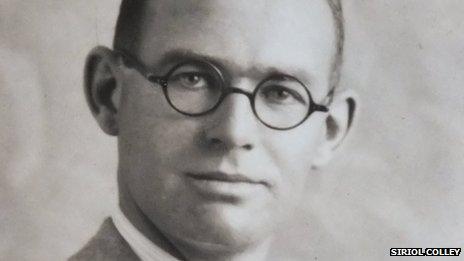Journalist Gareth Jones' 1935 murder examined by BBC Four
- Published

Gareth Jones was a talented linguist, speaking French, German and Russian
A Welsh journalist who once flew with Adolf Hitler, helped expose genocide in Joseph Stalin's Soviet Union and died in mysterious circumstances, is the subject of a new TV documentary.
Gareth Jones, who was also a personal aide to former prime minister David Lloyd George, helped expose Stalin's "holodomor" policy of deliberate starvation.
This claimed the lives of anywhere between 4m and 10m peasant farmers in the Ukraine during 1932/33.
Jones also formed relations with the Nazis in Germany and even flew aboard Hitler's private plane.
But in 1935 he was murdered in murky circumstances while reporting from Japanese-occupied Mongolia.
Now <italic>Hitler, Stalin and Mr Jones, </italic>on BBC Four's Storyville strand on Thursday, is examining the 77-year-old mystery of his death.
"Gareth Jones was almost an Icarus-type character, who knew how close to the sun he was flying, but couldn't seem to resist the temptation to expose tyrannical abuse of power," said George Carey, director of the programme.
Born in the south Wales coastal town of Barry in 1905, Jones earned a first in French from Aberystwyth University in 1926, securing the same grade in French, Russian and German at Trinity College, Cambridge, three years later.
His linguistic skills saw him rise to prominence in diplomatic circles, and by 1930 he was foreign policy adviser to the former prime minister, fellow Welshman David Lloyd George.
While some contemporaries accused him of harbouring Nazi sympathies, according to Mr Carey, history appears not to bear this out.
"It's certainly true to say that Gareth Jones networked extremely well with the Nazis, and secured almost unprecedented access to Hitler and Goebbels," he said.
"He was there in Leipzig when Hitler was made chancellor, and flew with him to Frankfurt for his first rally.
Peasant farmers
"And it's also fair to say that he reported favourably on some of the early achievements of the Nazis, creating employment when mainstream politicians had failed to get to grips with the German economy.
"But he was also one of the first journalists to see that anti-Semitism was at the core of the Nazis, not just a thug fringe, and to recognise the potential damage which this would later cause."
It seems as though Jones's attentions always lay in the direction of the Soviet Union.
Backed by Lloyd George's credibility, he was able to travel throughout the USSR and met Russian politicians, while his language skills allowed him to speak to peasant farmers.
However, his warm Soviet welcome would cool abruptly in March 1933, when Jones called a press conference in Berlin to reveal the findings of his two months undercover in starving Ukraine.
The mainstream media poured scorn on Jones' account, and for a time he was reduced to obscurity. By mid-1933 he had returned home to Barry to live with his parents and he worked as a junior reporter on the Western Mail.
But months later he learned about a new international scandal, in the shape of the Japanese occupation of Inner Mongolia, and he set off there as soon as he could to raise the funds.
'Agent'
The trip would prove his downfall, as he and his companion, a German journalist named Muller, were captured by bandits in remote countryside, after being turned away by Japanese forces.
Mr Carey said Jones's death had always been surrounded by controversy, as it was unclear whether the bandits were tipped off by the Japanese, or by the Russian secret police, the NKVD.
"Until now all that was known for certain was that Muller was released on a highly spurious pretext about having been freed on parole in order to raise the ransom, and two days later Gareth was shot for no conceivable reason," he said.
"Probably we'll never know for certain what happened. However our investigations have shown that the Chinese contact who loaned Jones and Muller a car to travel to Mongolia was definitely an NKVD agent, and there's strong evidence to suggest that Muller might also have been."
Gareth Jones died a largely discredited figure, on the eve of his 30th birthday, the truth about Stalin's holodomor only coming to light years later.
However, today he is revered as a national hero in the Ukraine, and is honoured at both Cambridge and Aberystwyth universities.
<bold> <italic>Hitler, Stalin and Mr Jones </italic> </bold> <bold>was broadcast on BBC Four's Storyville on 5 July and is </bold> <link> <caption>available on BBC iPlayer until 30 July 2012.</caption> <url href="http://www.bbc.co.uk/iplayer/episode/b01kg4tx/Storyville_20112012_Hitler_Stalin_and_Mr_Jones/" platform="highweb"/> </link>